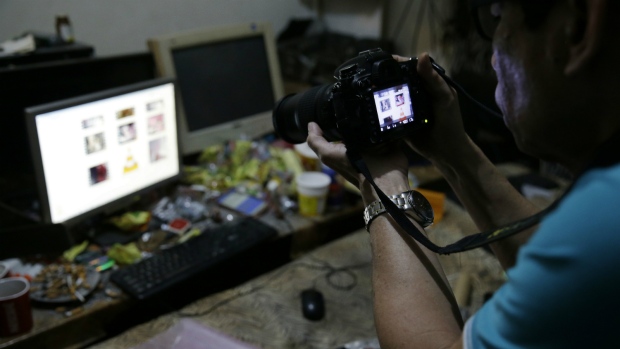
MANILA – Chang has no desire to go home to her parents, at least not yet.
The 18-year-old Filipina has lived in a shelter since being rescued four years ago from a neighbor who forced her to perform sexual acts in front of a webcam for overseas predators.
“When I am ready to face them – to tell them that I am new and that I can handle myself – then I will go home,” said Chang, who is too ashamed to return home. Her abuser has been jailed.
“Only when I am successful,” she told the Thomson Reuters Foundation, explaining how she was lured into a den of abuse with the promise of a few dollars to buy a new pair of jeans.
Chang is one of hundreds of girls and young women in the care of charities after being saved from cybersex trafficking – a form of modern-day slavery that saw 60,000 reports logged in the Philippines in 2018, a five-fold increase over four years.
Campaigners put the country at the global epicenter of the growing trade, which is creating a crisis of care for rising numbers of children, many very young, who often have to be removed from families that profit from their exploitation.
Led by police in the Philippines, a new global taskforce has this year been tracking down and rescuing children abused online as it works through a backlog of hundreds of cases.
With investigators from Britain and Australia backing local cops working solely on cybersex trafficking, the Philippines is clamping down on an illicit industry that has been fuelled by cheap internet, the high level of English and rampant poverty.
Yet the crackdown is set to see the number of children in need of protection soar, leaving shelters scrambling to keep up.
“With the anticipated influx of cases, additional human and material resources are required to cater to the needs of the victims,” said Zafrin Chowdhury, a spokeswoman for the United Nations children’s agency (UNICEF).
The Philippines is training officials to care for children who have been abused sexually online, said Chowdhury of UNICEF, which works with the government to develop aftercare programs.
Officials from the nation’s department of social welfare and development – the lead government agency tasked with responding to the issue – were not immediately available for comment.
STAYING SAFE
Since 2011, the International Justice Mission (IJM), an anti-trafficking charity backing the taskforce, has rescued more than 400 children from dens of online sex abuse, and placed them in 25 shelters certified to care specifically for survivors.
Once rehabilitated, carers then search for a family member deemed appropriate and reliable to continue raising the child.
Failing that, some go on to live alone, helped by charities, some stay in the shelters, and a small few go into foster care.
While stigma stops Chang from going home, many victims want to be reunited with their parents – even though they took money from abusers who forced the children to perform sex acts online.
Abusers can earn up to $100 per show in the country where about a fifth of its 105 million people live in poverty – earning less than $2,000 a year – according to government data.
As relatives or family friends are the exploiters in most cases, cybersex trafficking has become normalized to the point where many victims – whose average age is 12 – reject aftercare.
“It’s so challenging for us to explain to these children that they must stay in the shelter to remain safe,” said Delores Rubia, IJM’s director of aftercare for children – a fifth of whom are six years old or younger.
“They are very young and they have not experienced other ways of life so they would say this is normal,” she said, adding that initially harmless interactions often evolve into violent abuse such as siblings made to perform sex acts upon each other.
No data exists on the number of child victims of cybersex trafficking, but about 784,000 people in the Philippines – or one in 130 – are estimated to be living as modern slaves, found the Global Slavery Index by the charity Walk Free Foundation. (Reuters)



